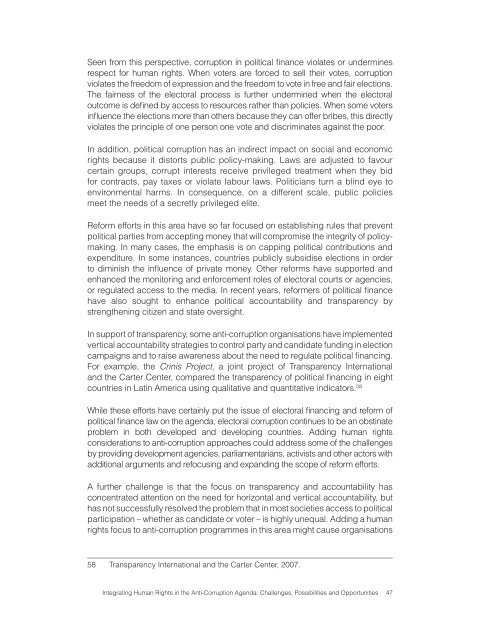Integrating Human Rights in the Anti-Corruption Agenda - The ICHRP
Integrating Human Rights in the Anti-Corruption Agenda - The ICHRP
Integrating Human Rights in the Anti-Corruption Agenda - The ICHRP
You also want an ePaper? Increase the reach of your titles
YUMPU automatically turns print PDFs into web optimized ePapers that Google loves.
Seen from this perspective, corruption <strong>in</strong> political f<strong>in</strong>ance violates or underm<strong>in</strong>es<br />
respect for human rights. When voters are forced to sell <strong>the</strong>ir votes, corruption<br />
violates <strong>the</strong> freedom of expression and <strong>the</strong> freedom to vote <strong>in</strong> free and fair elections.<br />
<strong>The</strong> fairness of <strong>the</strong> electoral process is fur<strong>the</strong>r underm<strong>in</strong>ed when <strong>the</strong> electoral<br />
outcome is def<strong>in</strong>ed by access to resources ra<strong>the</strong>r than policies. When some voters<br />
<strong>in</strong>fluence <strong>the</strong> elections more than o<strong>the</strong>rs because <strong>the</strong>y can offer bribes, this directly<br />
violates <strong>the</strong> pr<strong>in</strong>ciple of one person one vote and discrim<strong>in</strong>ates aga<strong>in</strong>st <strong>the</strong> poor.<br />
In addition, political corruption has an <strong>in</strong>direct impact on social and economic<br />
rights because it distorts public policy-mak<strong>in</strong>g. Laws are adjusted to favour<br />
certa<strong>in</strong> groups, corrupt <strong>in</strong>terests receive privileged treatment when <strong>the</strong>y bid<br />
for contracts, pay taxes or violate labour laws. Politicians turn a bl<strong>in</strong>d eye to<br />
environmental harms. In consequence, on a different scale, public policies<br />
meet <strong>the</strong> needs of a secretly privileged elite.<br />
Reform efforts <strong>in</strong> this area have so far focused on establish<strong>in</strong>g rules that prevent<br />
political parties from accept<strong>in</strong>g money that will compromise <strong>the</strong> <strong>in</strong>tegrity of policymak<strong>in</strong>g.<br />
In many cases, <strong>the</strong> emphasis is on capp<strong>in</strong>g political contributions and<br />
expenditure. In some <strong>in</strong>stances, countries publicly subsidise elections <strong>in</strong> order<br />
to dim<strong>in</strong>ish <strong>the</strong> <strong>in</strong>fluence of private money. O<strong>the</strong>r reforms have supported and<br />
enhanced <strong>the</strong> monitor<strong>in</strong>g and enforcement roles of electoral courts or agencies,<br />
or regulated access to <strong>the</strong> media. In recent years, reformers of political f<strong>in</strong>ance<br />
have also sought to enhance political accountability and transparency by<br />
streng<strong>the</strong>n<strong>in</strong>g citizen and state oversight.<br />
In support of transparency, some anti-corruption organisations have implemented<br />
vertical accountability strategies to control party and candidate fund<strong>in</strong>g <strong>in</strong> election<br />
campaigns and to raise awareness about <strong>the</strong> need to regulate political f<strong>in</strong>anc<strong>in</strong>g.<br />
For example, <strong>the</strong> Cr<strong>in</strong>is Project, a jo<strong>in</strong>t project of Transparency International<br />
and <strong>the</strong> Carter Center, compared <strong>the</strong> transparency of political f<strong>in</strong>anc<strong>in</strong>g <strong>in</strong> eight<br />
countries <strong>in</strong> Lat<strong>in</strong> America us<strong>in</strong>g qualitative and quantitative <strong>in</strong>dicators. 58<br />
While <strong>the</strong>se efforts have certa<strong>in</strong>ly put <strong>the</strong> issue of electoral f<strong>in</strong>anc<strong>in</strong>g and reform of<br />
political f<strong>in</strong>ance law on <strong>the</strong> agenda, electoral corruption cont<strong>in</strong>ues to be an obst<strong>in</strong>ate<br />
problem <strong>in</strong> both developed and develop<strong>in</strong>g countries. Add<strong>in</strong>g human rights<br />
considerations to anti-corruption approaches could address some of <strong>the</strong> challenges<br />
by provid<strong>in</strong>g development agencies, parliamentarians, activists and o<strong>the</strong>r actors with<br />
additional arguments and refocus<strong>in</strong>g and expand<strong>in</strong>g <strong>the</strong> scope of reform efforts.<br />
A fur<strong>the</strong>r challenge is that <strong>the</strong> focus on transparency and accountability has<br />
concentrated attention on <strong>the</strong> need for horizontal and vertical accountability, but<br />
has not successfully resolved <strong>the</strong> problem that <strong>in</strong> most societies access to political<br />
participation – whe<strong>the</strong>r as candidate or voter – is highly unequal. Add<strong>in</strong>g a human<br />
rights focus to anti-corruption programmes <strong>in</strong> this area might cause organisations<br />
58 Transparency International and <strong>the</strong> Carter Center, 2007.<br />
<strong>Integrat<strong>in</strong>g</strong> <strong>Human</strong> <strong>Rights</strong> <strong>in</strong> <strong>the</strong> <strong>Anti</strong>-<strong>Corruption</strong> <strong>Agenda</strong>: Challenges, Possibilities and Opportunities 47

















